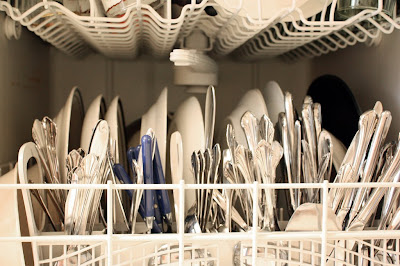Another blog reprint. Hope you are finding these helpful. When I made a blogging change, I left behind a lot of posts I had written, some of which were favorites of mine.
Yes, the title is correct. Cleaning your dishwasher regularly is a really good idea in case you have not considered it before. I'm not just talking about the front panel or the control buttons. I'm talking about the inside as well. Food, grease, soap scum, and mineral deposits all add up to make for a perfect storm inside that wonder machine. A few months ago, we were experiencing a terrible problem with little bits of food particles all over our glassware which led me to researching how to solve this issue. I found out several things I never knew which has curbed the problem nearly 100 percent (the remaining food particles have more to do with a ten-year old loading the dishwasher than the dishwasher itself!).
Photo Credit: justmakeit
• The best tip I got was do not to use liquid or gel dishwasher detergent if you have a water softener. Switch to powder and use just a small amount. You may need to observe over a week as you adjust the detergent levels until you get the right amount. For me, I use only about a half-teaspoon in the prewash and a teaspoon in the regular cycle. On the Mrs. Clean website, they recommend that you never use gel detergents even if you have hard water because they use bleach (bad for your septic), often leave a cloudy film on glasses, stick to the inside surface of the dishwasher, can clog the soap dispenser, and aren't really effective overall.
• Second, if you have a water softener, do not use a rinse aid. If you continue to do so, the soap scum just builds and builds. You really shouldn't need it anyway if you have soft water. Hard water folks, keep using it if you wish.
• To clean a dishwasher on the inside, place a glass cup filled with white vinegar in the top rack of your empty dishwasher. Run it on the hottest cycle possible. This will help remove greasy build up and soap scum. It should freshen the smell as well. If build up is really bad, refill the glass with fresh vinegar and repeat. I have used bleach and then followed with the vinegar in a second cycle, but only when things go super bad! It would be best to keep your dishwasher clean by doing this regularly.
Photo Credit: penelopejonze
• To remove stains, try sprinkling baking soda in the bottom and running it through a short cycle. However, this won't cure rust stains. For this, you will need to stop the rust at its source first (such as rusting pipes), then you can deal with the dishwasher.
• For the sides and around the seals, use an old toothbrush dipped in hot soapy water and go around all the crevices. If necessary, use something a bit more abrasive but safe for your type of appliance finish. Using a wet sponge, wipe well to get the soap off.
• Don't forget to check the bottom of your dishwasher as well as the sprayers. This may need some additional elbow grease as well. You may wish to do this in between two vinegar cycles.
• Finally, clean out the drain. Refer to your owner's manual to determine where this is located and how to clean it out. It may be a bit repulsive, but do you really want that stuff backing up onto your dishes?




